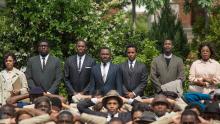In solidarity with national protests against anti-Black violence, the Department of Cinema and Media Studies celebrates the revolutionary work of Black directors, writers, and producers, past and present. Here, we recommend 20 groundbreaking films and television shows by Black directors, many of which celebrate the history and present of Black political resistance. This far-from-exhaustive list represents a mixture of features, television, and short films; fiction and documentary; U.S.-based and international cinema. Nearly everything presented below is currently free to stream, some for a limited time only. Don’t miss your chance to see these outstanding films!
Visit LANGSTON, home of the Seattle Black Film Festival, to learn about how to engage and support Black arts and culture in the Seattle area. For general educational resources on anti-racism, we recommend this blog post by our colleagues in American Ethnic Studies. And stay tuned for the upcoming Juneteenth Movie Night, hosted by Black Lives Matter-King County Seattle.
Temporarily Available for Free Rental:
Daughters of the Dust (Julie Dash, 1991, 1h 12min). Temporarily available to stream for FREE on Criterion Channel with no subscription required.
Julie Dash’s lush, dreamy feature film explores the life of a multi-generational Gullah family in the Sea Islands in 1902 as they process past traumas and future choices. The costumes, settings, and cinematography served as a major inspiration for parts of Beyoncé and Khalil Joseph’s 2016 film Lemonade.
Killer of Sheep (Charles Burnett, 1977). Temporarily available to stream for FREE on Milestone Films (normally $4.99 rental).
Submitted as director Charles Burnett’s Master’s thesis at the UCLA School of Film, Killer of Sheep was immediately hailed as a classic of African American cinema. Through a series of vignettes, the film follows the life of Stan, a sensitive dreamer suffering from depression—due, in part, to his oppressive work in a slaughterhouse—while also providing an expansive portrait of Black culture in LA’s Watts neighborhood.
Losing Ground (Kathleen Collins, 1982, 1h 26min). Temporarily available to stream for FREE on Criterion Channel with no subscription required.
Kathleen Collins’s semi-autobiographical tale follows the artistic growth and romantic entanglements of a black female philosophy professor. One of the first feature-length narrative films directed by an African American woman, the film was out of circulation for over thirty years before its “rediscovery” and restoration in 2015.
Selma (Ava Duvernay, 2014). Temporarily available to rent for FREE on all streaming platforms for the month of June, courtesy of Paramount Pictures. Watch on Amazon or YouTube.
This historical drama explores the organization of the 1965 Selma to Montgomery marches, and the violent police reactions to these peaceful protests. Selma is unique among historical dramas in that it focuses less on heroic personalities, and more on the tactics, strategies, and forms of cooperation shared amongst Civil Rights organizers.
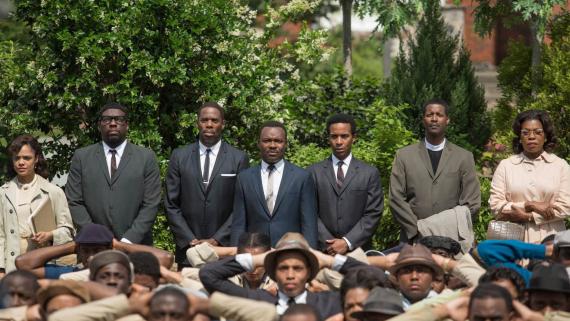
Touki Bouki (Djibril Diop Mambéty, 1973, 1hr 35min). Available to stream for free on YouTube, or to Criterion Channel subscribers.
This classic of Senegalese cinema follows the surreal motorcycle journey of two lovers who try to escape rural Senegal for the opportunities of France—and who encounter obstacles and self-doubt along the way.
The Watermelon Woman (Cheryl Dunye, 1996). Temporarily available to stream for FREE on Criterion Channel with no subscription required. Regularly available only to Criterion Channel Subscribers.
A funny, joyful celebration of Black queer life in 1990s Philadelphia, The Watermelon Woman follows aspiring filmmaker Cheryl on her quest to track down an unnamed Black actress from the silent-era—and to rewrite Black lesbian history in the process.
Always Free (some films require a Seattle Public Library card):
Black Celebration (Tony Cokes, 1988, 17min). Watch for FREE on UbuWeb.
“The intent of the piece,” writes filmmaker Tony Cokes, “is to introduce a reading that will contradict received ideas which characterize these riots as criminal and irrational.” Cokes reworks footage of the Watts uprisings (Los Angeles, 1965) and several other major protests, incorporating music and text commentary that presents these “riots” as revolutions.
Handsworth Songs (John Akomfrah, 1986, 1h 1min). Watch for FREE on UbuWeb.
A classic of the essay film genre, Handsworth Songs was produced by the pioneering Black Audio Film Collective, an artists' group devoted to exploring the Black diaspora in Britain. The film explores the 1986 Handsworth Riots in the city of Birmingham from the perspective of protestors, witnesses, and the media.
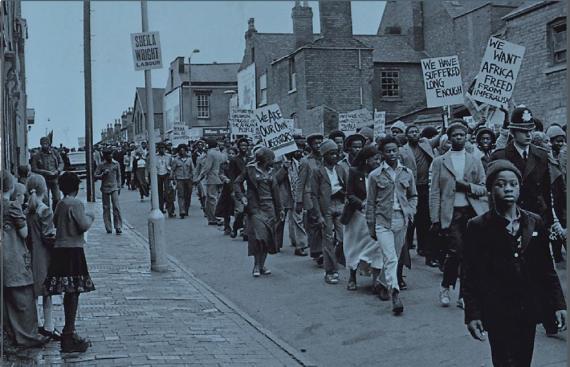
I Am Not Your Negro (Raoul Peck, 2016, 1h 24min). Available to stream for free on Kanopy for users with a UW ID or a Seattle Public Library Card.
Based on an unfinished manuscript by James Baldwin, I Am Not Your Negro brings to life the incendiary words of the legendary Black queer writer. Baldwin’s manuscript tells the story of the lives and assassinations of Medgar Evers, Malcolm X, and Martin Luther King. Using a montage of historical and contemporary footage, director Raoul Peck connects Baldwin’s radical writing with contemporary struggles for Black liberation. With narration by Samuel L. Jackson.
Kindah (Ephraim Asili, 2016, 12min) and Fluid Frontiers (Ephraim Asili, 2017, 23min). Available for free on the artist’s Vimeo site.
Respectively the fourth and fifth films in Asili’s five-part series, The Diaspora Suite, in which Asili explores his personal relationship with the African Diaspora. Kindah intercuts footage from diaspora communities in Asili’s home base of Hudson, NY, and in Accompong, Jamaica, a community founded in 1739 by the descendants of rebel slaves. Fluid Frontiers explores Black communities in Detroit, MI and Windsor, ON, on both sides of the US-Canadian border. The cities were a major terminus in the Underground Railroad and are now home to the communities of Black artists, poets, and performers featured in the film.
Personal Problems (Bill Gunn, 1980, 2h 44m). Available to stream for free on Kanopy for users with a UW ID or a Seattle Public Library Card.
Originally conceived and written for television by novelist Ishmael Reed, Personal Problems is a “meta soap opera” about the everyday lives of Black New Yorkers. In just two “episodes,” it presents a kaleidoscopic, poetic view of love, work, and city life.
Sweet Sweetback’s Baadasssss Song (Melvin Van Peebles, 1971, 1h 38min). Available to stream for free on Kanopy for users with a UW ID or a Seattle Public Library Card.
Dedicated to viewers who have "had enough of the Man," Melvin Van Peebles's radical independent film later inspired the Hollywood genre known as 'Blaxploitation.' Van Peebles plays Sweetback, a hustler who finds himself radicalized after witnessing the murder of a Black revolutionary at the hands of the police.
Tongues Untied: Giving a Voice to Black Gay Men (Marlon Riggs, 1989, 55 minutes). Available to stream for free on Kanopy for users with a UW ID or a Seattle Public Library Card.
In this experimental documentary, activist, poet, and filmmaker Marlon Riggs explores the complex experiences of Black gay men as they negotiate both racism and homophobia. When the film was scheduled to screen on PBS in 1989, conservative politicians protested the use of taxpayer money to broadcast materials they found “offensive," inspiring several public demonstrations of support by the Black queer community.
Three Songs about Liberation (Cauleen Smith, 2017, 10 min). Watch for FREE on the artist’s Vimeo page. Commissioned for the Smart Museum of Art at the University of Chicago, Smith’s short films visualize three monologues adapted from the influential edited collection, Black Women in White America: A Documentary History, edited by Gilda Lerner.
Within Our Gates (Oscar Micheaux, 1920, 1 hr 15 min). Available to stream for free on Kanopy for users with a UW ID or a Seattle Public Library Card.
A classic of African American silent cinema, Within Our Gates responds explicitly to D.W. Griffith’s famously racist feature, The Birth of a Nation (1915). The film explores the crisis of purpose and identity faced by biracial protagonist Silvia as she lives through memories of the violence of the Jim Crow south. The edition here features a soundtrack by Paul Miller (DJ Spooky).
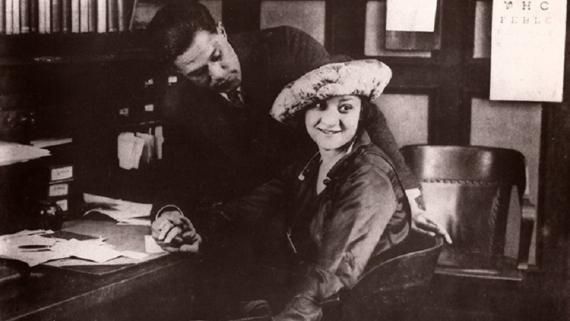
Available on popular streaming services, or for a small rental fee:
Atlantics (Mati Diop, 2019, 1h 46min). Available to Netflix subscribers. 

Winner of the Grand Prix at Cannes, this cinematic debut by the young French-Senegalese filmmaker Mati Diop is at once a supernatural love story, a tale of migration, and a scathing critique of corporate greed.
Atlanta (Produced by Donald Glover, FX Network, 2016-2021). Seasons 1-2 available to Hulu subscribers; 30 day free trial available.
Donald Glover’s surreal and darkly humorous drama follows two cousins trying to break into in the Atlanta music scene—and meditates on the meaning of Black male identity in a white supremacist world. Famously pushing the boundaries of televisual form Atlanta features gorgeous cinematography and consistently scene-stealing performances by Lakeith Stanfield and Zazie Beetz.
I am Somebody (Madeline Anderson, 1970, 28min). Rent for $2.99 on Vimeo, courtesy of Icarus Films.
In 1960, over 400 Black female hospital workers went on strike in Charleston, South Carolina—and the government called in the National Guard. A moving document of the Civil Rights movement that is especially relevant today.
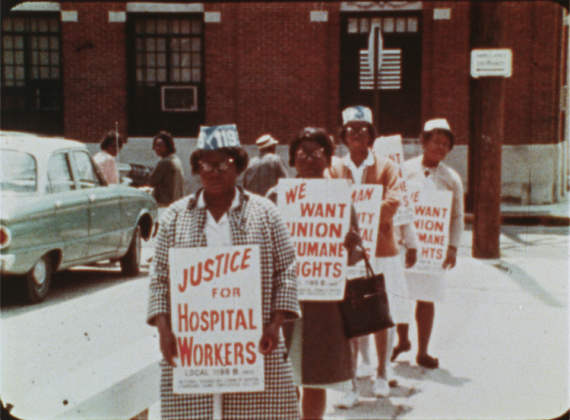
Queen Sugar (Produced by Ava DuVernay, OWN Network 2016-2020). Season 1 available to Hulu subscribers; 30 day free trial available.
Based on the novel by Natalie Baszile and produced by Selma director Ava DuVernay, this gripping family drama follows the lives of three siblings who have inherited their late father’s sugarcane farm in rural Louisiana. Featuring episodes directed by Julie Dash, Cheryl Dunye, and So Yong Kim, Queen Sugar is the only television show in history for which every episode was made by a female director.
Sorry to Bother You (Boots Riley, 2018, 1h 51min). Available on Hulu to subscribers; 30 day free trial available.
Hailed by many critics as one of the best films of 2018, Boots Riley’s directorial debut is a dark comedy about racial performance and exploitation—as well as a love letter to the power of protest and organization.
